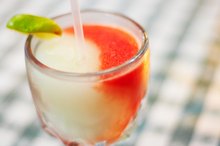Problems With Water Retention and Drinking Alcohol
Water retention is also known as edema, and is most commonly characterized as puffiness in the extremities 1. While it most commonly presents in the feet, ankles and legs, it can also manifest itself in the fingers, face and, in some cases, the belly. (Ref 1) Water retention can result from a number of causes, including drinking alcohol 1. While most cases of water retention can be treated at home, severe, prolonged or frequent cases should be studied by a doctor 1. (Ref 1)
If you are experiencing serious medical symptoms, seek emergency treatment immediately.
Water Retention
Water retention occurs when your body holds onto fluids in the cavaties and soft tissues of your body 1. This is an attempt to preserve fluid content in your body, to prevent the possibility of dehydration. To treat water retention at home, rehydrate yourself by drinking more non-diuretic fluids, as diuretics, such as alcohol, cause your body to release fluids, increasing your body’s protective anti-dehydration response 1. (Ref 1)
Alcohol as a Diuretic
The Effects of Alcohol on Fitness
Learn More
Alcohol is a natural diuretic, which, even when consumed in small amounts, can cause your body to lose more fluids than your body is comfortably able to manage. (Ref 3) Diuretics encourage urination. (Ref 5) According to Creighton University, alcohol consumption can cause dehydration that is sufficiently severe it takes upwards of a week for your body to fully recover. (Ref 4)
- Alcohol is a natural diuretic, which, even when consumed in small amounts, can cause your body to lose more fluids than your body is comfortably able to manage.
- ( Ref 5) According to Creighton University, alcohol consumption can cause dehydration that is sufficiently severe it takes upwards of a week for your body to fully recover.
- (
Staying Hydrated
To balance out the diuretic effects of alcohol consumption, you need to replenish your fluids. While some of the water in your system is produced during digestion, particularly of water-rich foods, you still require additional fluids to stay properly hydrated. The general recommendation is a minimum of six to eight 8 ounce glasses of fluids each day, and while the optimal choice is water, other fluid rich beverages, such as:
- soup
- milk
- juice
- can also provide hydration
(Ref 3) Avoid alcohol and caffeinated drinks, such as coffee, tea and colas, as caffeine is also a natural diuretic. (Ref 3)
- To balance out the diuretic effects of alcohol consumption, you need to replenish your fluids.
- While some of the water in your system is produced during digestion, particularly of water-rich foods, you still require additional fluids to stay properly hydrated.
Other Concerns
Cranberry Juice for Water Retention
Learn More
In addition to water retention and possible dehydration, alcohol consumption, especially in excess and in the long term, can cause other health complications 1. Alcohol increases the amount fo fat storage in your body by changing your body composition, while simultaneously slowing down your reaction time and thinking speeds. (Ref 4) Regular overconsumption could also lead to an increased risk of liver disease, heart disease, and even possibly brain damage. (Ref 4) The U.S. Department of Agriculture states that moderate drinking, no more than one drink per day for women and a maximum of two per day for men, will likely not have an adverse effect on overall health 5. (Ref 6)
Related Articles
References
Writer Bio
Amber Keefer has more than 25 years of experience working in the fields of human services and health care administration. Writing professionally since 1997, she has written articles covering business and finance, health, fitness, parenting and senior living issues for both print and online publications. Keefer holds a B.A. from Bloomsburg University of Pennsylvania and an M.B.A. in health care management from Baker College.









